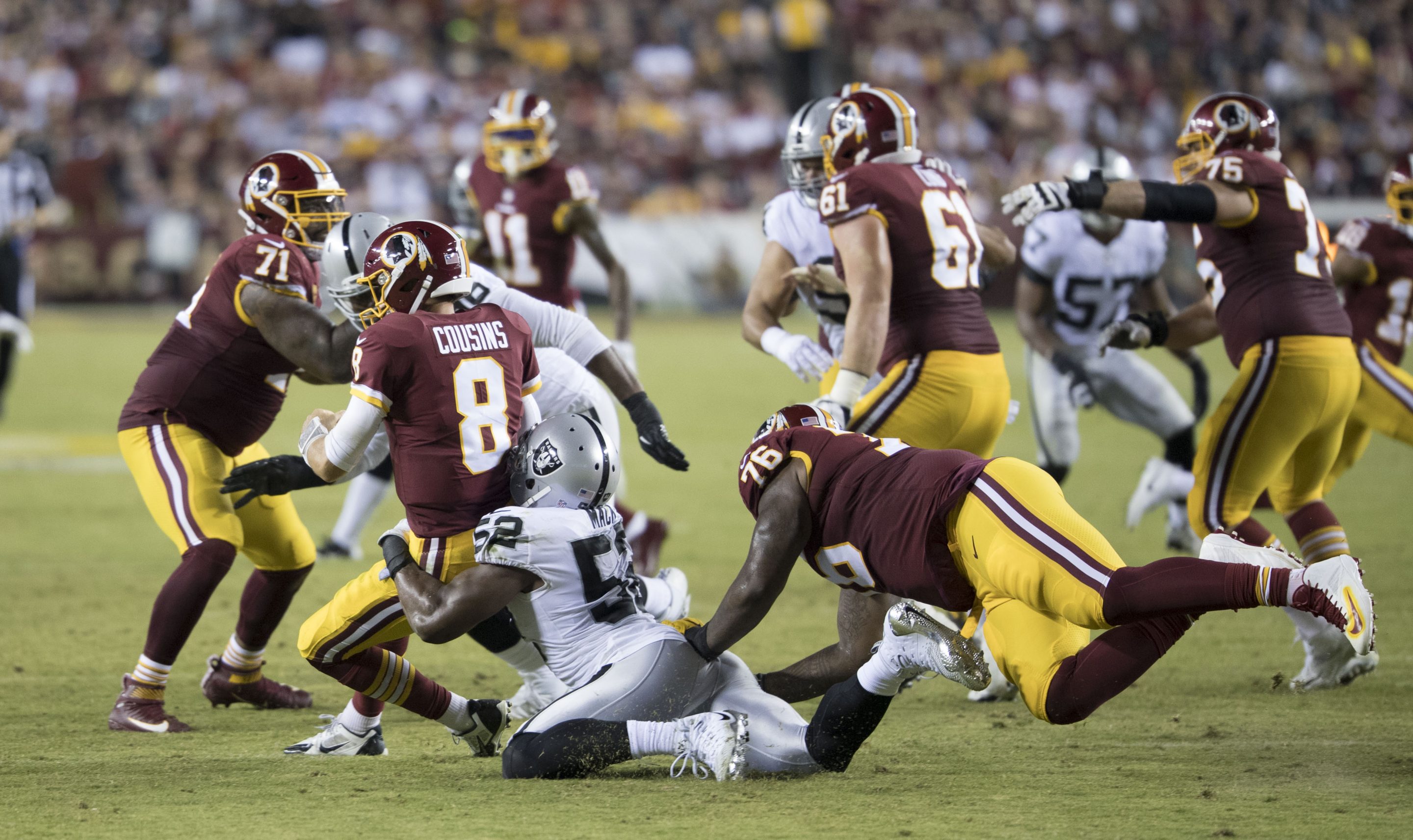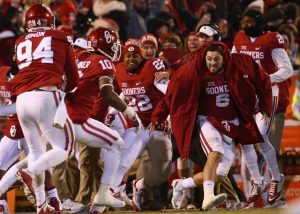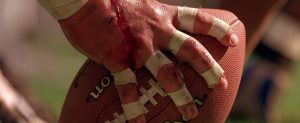Reactions to the Oakland Raiders’ trade of superstar defensive end Khalil Mack to the Chicago Bears on September 1st have poured in from every corner of the NFL world. The consensus on the deal is that Mack’s move to the Windy City is equally as damning for the Raiders as it is thrilling for the Bears, with Fox Sports commentator and human take-generator Skip Bayless going so far to say, “I’ve never seen anything this dumb before” and that the Raiders’ hiring of Head Coach Jon Gruden in the offseason to a 10-year contract has already been “definitely disqualified” with the move. For his part, Mack poured salt in the wounds of Raiders fans by wreaking relentless havoc in his Chicago debut against the Packers last Sunday, with a sack, a pick-six, and an utterly disrespectful strip and recovery of DeShone Kizer. With public opinion near-unanimous that the Bears just fleeced the Raiders in acquiring one of the top players at any position in a league that rarely sees its’ stars swapping colors, I’m here to present a case that this trade is not nearly as bad for the Raiders’ future as it seems on the surface. In fact, Jon Gruden and Oakland may have just won the Khalil Mack trade.
First, the obvious: this trade makes plenty of sense for the Bears. Chicago and Oakland are two franchises that were clearly headed in opposite directions even before the Mack deal came together. If I were in general manager Ryan Pace’s shoes, I would have pulled the trigger on this swap all the same. The next few years are the Bears’ window to win, and Pace and first-year head coach Matt Nagy have just signaled to the league that they will do exactly that or get canned trying. The players that will form the Bears’ core in the coming years – Mitch Trubisky, Roquan Smith, Leonard Floyd, and Jordan Howard, among others – are still on rookie contracts, and Pace will shop till he drops (or at least until he hits the cap ceiling) in the meantime.
This offseason, that meant re-upping cornerback Kyle Fuller to a back-loaded four year, $56 million contract before spending more than anyone else in 2018 free agency, splurging on weapons for Trubisky like Allen Robinson (3 years, $42 million), Trey Burton (4 years, $32 million), and Taylor Gabriel (4 years, $28 million), while adding Prince Amukamara (3 years, $27 million) to pair with Fuller at cornerback. With the Mack trade, a ravenous fan base that hasn’t seen a postseason since 2010 finally has a team that appears a legitimate contender if Trubisky comes along. We all saw what the monster this Bears’ defense can be in the first half against the Packers – but now it’s time to get the wins to match.
Finding a willing trade partner in Chicago, the Raiders tried to squeeze every ounce they could out of the Bears’ draft capital, and they didn’t do poorly, in my opinion. The final deal looked like this: Mack, a 2020 2nd rounder, and a conditional 2020 5th rounder to the Bears in exchange for Chicago’s first-rounders in 2019 and 2020, a 3rd-rounder in 2020, and a 2019 6th rounder. Many will fault the Raiders for giving up that additional 2nd-rounder, while also lamenting that the two first-rounders going the Raiders’ way will never have the same impact as Mack in the silver and black. While these are valid concerns, we cannot diminish the value of holding another team’s first-round picks in the NFL Draft.
For example, taking a look at players selected in the 2010 Draft, first-round draft picks were starters for 67.5 percent of games played in the five years after they were selected – that figure drops to 33.8% for second rounders. While one could argue that this may be the result of teams favoring first-rounders as starters in efforts to insulate themselves from fans’ criticism for wasting draft choices, it’s hard to argue with the fact that 48.5 percent of All-Pro selections between 2012-14 were first-round picks – only 39.8 percent of All-Pros came from the other six rounds of the Draft. Simply put, if you want to find those players that can change your franchise’s fortunes overnight, the conversation starts and ends with first-rounders. Oakland has four of them in the next two years, and now it’s very possible that their own selections are going to be inside the top five picks.
By dealing Mack to Chicago, the Raiders are betting against the Bears among the teams that called to inquire on Mack’s availability – at least half the league. The Las Vegas Review-Journal’s Michael Gehlken said Gruden and GM Reggie McKenzie narrowed Mack’s suitors down to who they believed could present a high first-round pick in 2019. It’s hard to fault their logic – the jury is still very much out on the Bears’ second-year signal caller Mitch Trubisky, who averaged only 4.9 YPA in that season-opening loss to Green Bay. The Bears finished a disappointing 5-11 in 2017 to wind up with the 8th overall pick in the Draft, and most would agree the NFC North has only gotten stronger this offseason, with the Packers returning a healthy (we think) Aaron Rodgers and the Vikings adding Kirk Cousins. Additionally, the Bears have the fifth-smallest available cap space heading into 2019 according to Over the Cap, meaning if the Bears can’t jell after their historic offseason of roster turnover, they have little flexibility to continue to improve next offseason. And as exciting as their showdown with the Packers on Sunday Night Football was, the Bears’ loss against their divisional opponent could have serious postseason implications down the road.
In 2019, Mack will start the season with his gleaming new contract that will pay him 11.7% of the Bears’ total salary cap. Though pass-rusher is probably the second-most important position on the field in the modern NFL, statistics just don’t back up the idea that teams are more likely to win with a singular player, no matter his ability, taking up so much of the cap. If the Raiders were to have paid Mack, they would have two players (Derek Carr and Mack) taking up over 25 percent of their cap room on a 53-man roster! The Super-Bowl winning Eagles had no player taking up more than 6.1 percent of their cap in 2017. Their opponent in the Super Bowl, the New England Patriots, only had Tom Brady (8.36%) above 7 percent. The Minnesota Vikings and Jacksonville Jaguars, the other two conference finalists and the top two total defenses in 2017, had no defensive players taking up more than 8 percent of the cap. These teams were built through the Draft and rode veterans on value contracts and young stars on rookie deals to the top. Jon Gruden, meanwhile, has the type of job security almost never given to first-year head coaches, and certainly not available to his trading partners Nagy and Pace. With his hot-off-the-press decade-long deal, the Super Bowl XXXVII winner will be afforded the time and trust of owner Mark Davis to see this rebuild out in its entirety.
The Raiders know the blueprint they’ll have to follow to rise back into contention, even if they’ve turned a lot of people off in the process. Last season, even with a dominant Mack, the Raiders’ defense was 26th in the league against the pass en route to a 6-10 finish. It’s a credit to them that they realized they were headed for the same mediocre fate if they paid Mack the big bucks, as the franchise did not make any impact additions on either side of the ball in the offseason. The elephant in the room, of course, is the unsightly 5-year, $125 million contract that Carr signed prior to the 2017 season.
Though Carr has flashed potential in his career, it doesn’t seem like he’s going to be able to deliver on that massive commitment, and he about confirmed as much with a three-interception performance in Week 1 as the Raiders got dominated by the Rams, 33-13. In dealing Mack and setting their sights on the future, the Raiders are making the best of a bad situation that Carr’s contract is very much a part of – if Carr does turn it around, there’s your franchise quarterback leading a team chock-full of first-rounders on rookie contracts in the next few years. If he can’t, the Raiders can select his replacement with one of those draft selections and cut Carr in a few years when the dead money they’ll incur on his contract won’t be nearly as bad.
The 2019 Draft has a number of intriguing arms highlighted by Oregon’s Justin Herbert and Missouri’s Drew Lock, as well as a dominant pass rusher in Ohio State’s Nick Bosa and all-around take-it-to-the-bank freaks like Houston defensive tackle Ed Oliver and LSU corner Greedy Williams. NFL scouts are already salivating over the 2020 crop of QBs led by Georgia’s Jake Fromm and Washington’s Georgia transfer Jacob Eason. Whatever happens with Carr, the Raiders’ influx of young talent on the way and 2019 cap space ($57 million according to OTC) should at least offer a glimmer of hope for Raider Nation as they gear up for what’s almost certain to be a trying season.
That being said, it would be remiss not to address the message that trading Khalil Mack sends from the Raiders to their long-suffering fanbase. In Mack, Oakland had the gem of McKenzie’s drafting history, a homegrown cornerstone for the franchise who is equally influential in the locker room. For Mark Davis to ship out one of the few things the Raiders have done right since his father passed when it was time to pay up is troubling. There’s also the question of paying Carr, drafted one round after Mack in 2014, when the Fresno State product has provided more questions than answers while Mack has been producing every season. The Raiders were likely to struggle even with Mack this season, but that became nearly certain with his departure, and 2020 might not be much better. After that, when Gruden has a group of young, hungry players and cap space to burn, it’s off to Las Vegas for the franchise.
Fans in East Bay have a right to be fed up after all the triumphs and (mostly) tribulations they’ve seen in the last decade-plus. From a strictly on-field perspective, however, it looks like the Gruden has played the best hand he could with the cards he was dealt. Of course, as with player trades in any sport, only time will tell.
Image Credit: Wikimedia Commons






